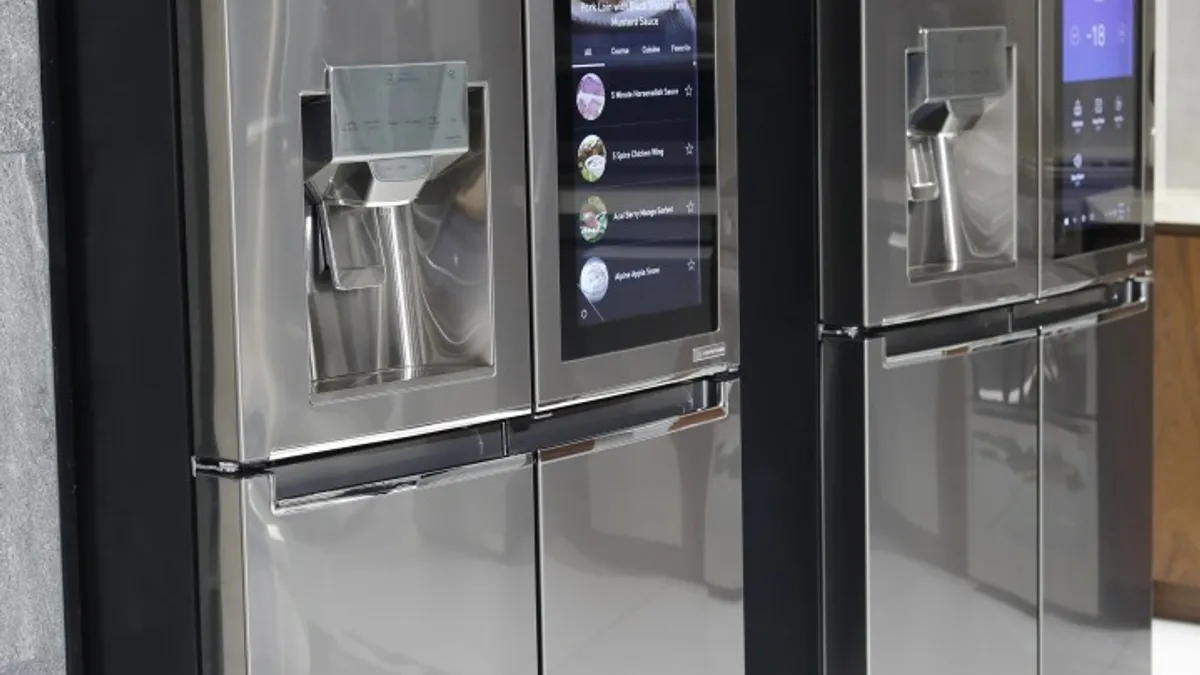Dive Brief:
- The Natural Resources Defense Council (NRDC) and several other conservation and consumer advocacy groups sued the U.S. Department of Energy (DOE) on Tuesday over the agency's revised process for setting appliance efficiency standards.
- More than a dozen states, along with New York City and the District of Columbia, have filed a similar lawsuit, challenging the changes DOE finalized in February to the "process rule," setting a baseline for savings required to update or create a new standard. The revised procedure requires a new standard to save 0.3 quadrillion BTUs of energy consumed by appliances on site over 30 years, but efficiency advocates say this is an "arbitrary" threshold.
- DOE is also now taking comment on how to prioritize its review of appliance standards under the new process rule procedures. The agency published the request for input on Wednesday, and advocates say they will be following it closely and believe the move is unnecessary.
Dive Insight:
The Trump administration says appliance standard rule changes will save American consumers money and allow the marketplace to develop more efficient products, but advocates continue to challenge DOE's actions and rationale.
The lawsuit filed Tuesday is the 107th legal challenge to the administration's approach to environmental issues, according to NRDC, and the third time in five months that groups have filed suit related to the appliance standards program. But according to DOE, the current rules require too much investment for savings that are not always significant.
"Clearer energy efficiency standards will provide certainty to manufacturers, allowing them to produce products that will save consumers money on a variety of appliances," U.S. Energy Secretary Dan Brouillette said in a statement. "These modernized procedures will increase transparency, accountability and regulatory certainty for the American people."
According to DOE, over the last three decades 60% of appliance standards met the 0.3 quad threshold — and the 40% that fell under the threshold accounted for only 4% of total energy savings.
"The Department of Energy wants everyone to think these are merely wonky procedural changes, but they will have enormous long-term effects on consumer budgets and the environment. And they’re illegal," Joe Vukovich, attorney and clean energy advocate for NRDC’s Climate and Clean Energy program, said in a statement.
Energy-saving standards for appliances and equipment like refrigerators, water heaters and air conditioners will help avoid a total of 3 billion tons of carbon dioxide pollution by 2030, according to NRDC.
The lawsuit was filed in the 9th U.S. Circuit Court of Appeals in San Francisco and argues the new process rule sets an arbitrary baseline for "significant savings" to establish a new standard. Along with NRDC, parties to the suit include Earthjustice, representing the Sierra Club, Consumer Federation of America, and Massachusetts Union of Public Housing Tenants; the U.S. Public Interest Research Group; and Environment America.
DOE requests comment on standards prioritization
While the groups' lawsuit gets underway, DOE has begun to determine under the new process rule changes how it should prioritize appliance standards updates.
"DOE expects that its modernized Process Rule will increase transparency, foster public engagement, and achieve meaningful burden reduction," the agency said in a request for comments published April 15. Under the updated rule, stakeholders will have "the opportunity to provide input on the prioritization of rulemakings as DOE begins its preparation of the Spring Regulatory Agenda."
If stakeholders believe the agency is pursuing a rule that should not be prioritized as active, "comments should reflect such an opinion and inform the Department as to how such rule should be prioritized, if at all," DOE said.
But efficiency advocates say DOE's obligations are set by statute and the prioritization process simply opens the door for further delay on required standards. DOE must review appliance standards every six years under federal law.
"Prioritization is unnecessary, especially when DOE has missed dozens of deadlines," Lauren Urbanek, senior energy policy advocate at NRDC's Climate and Clean Energy Program, told Utility Dive. "DOE is statutorily obligated to meet deadlines that are outlined by the law, and to date, this DOE has met none of them."
The federal government has missed 18 deadlines to review standards, according to NRDC.
"Their priority should be to follow the law, not to set up a redundant, subjective process to decide how they’re going to break the law. It’s a waste of time and resources," Urbanek said. "This is something NRDC will be following closely."
DOE is accepting comments on standards prioritization for the next 30 days.














